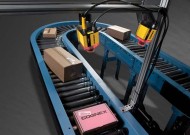 Retail distribution centres require meticulous stock control, which includes careful management of purchasing, shipping and warehouse inventory. Laser systems provide high read rates with good-quality printed barcodes when labels are undamaged, but they have difficulty reading codes under less than ideal conditions. Image-based readers can provide improved read rates, but their cost and complexity have limited their use to high-volume distribution centres… until now. A new generation of image-based readers is poised to revolutionize the market, offering sufficient speed at a price point equal to or lower than that of laser-based alternatives.
Retail distribution centres require meticulous stock control, which includes careful management of purchasing, shipping and warehouse inventory. Laser systems provide high read rates with good-quality printed barcodes when labels are undamaged, but they have difficulty reading codes under less than ideal conditions. Image-based readers can provide improved read rates, but their cost and complexity have limited their use to high-volume distribution centres… until now. A new generation of image-based readers is poised to revolutionize the market, offering sufficient speed at a price point equal to or lower than that of laser-based alternatives.
Image-based barcode reading systems offer several advantages over the laser-based variety. First, because a picture is worth a thousand scans, image-based readers begin with more information about the barcode. This advantage allows them to successfully read codes degraded by damage, orientation or distortion. To compensate for damage to the code or light reflections from the package, the analysis software can reconstruct the data of interest from any legible portion of the image.
Image-based systems can also store images for later retrieval and analysis. Archiving this information helps a distribution facility to determine the root cause for any unread barcodes and implement corrective actions, reducing the number of subsequent misreads and thereby improving process efficiency.
During operation, laser scanners provide no information to help the user determine why a read was unsuccessful. Data from the scanner indicates only the number of packages that were not read successfully, making any attempts to respond reflect pure guesswork rather than data-driven corrective action.
On the other hand, an image-based system can display the scanner image on a monitor or industrial display in real time. As the user sets the system up, the display shows exactly what the scanner sees, ensuring that the images will be in focus and that the image will include all codes on any package that comes down the conveyor. Both initial setup and later adjustments to improve the scanner’s read rate require little specialized knowledge, minimizing setup and maintenance times. And as image-based readers contain no moving parts, this typically results in a useful life that is two to three times longer than that of laser scanners.
Perhaps most important, as large retailers and Internet fulfilment centres consider capital equipment purchases to add capacity or increase throughput, raising barcode read rates by just 1 percent can significantly shorten payback schedules and increase ROI. Capital equipment acquisitions that improve read rates – such as this new generation of high-speed area array image-based readers – enjoy short payback times that can be measured in months, not years. So, the future belongs to the area scan image-based technology.
IMAGE-BASED BARCODE READER DESIGNED TO OUTPERFORM LASER SCANNERS
Cognex’s DataMan 500 barcode reader is designed to achieve higher read rates, offer improved on-line visualization and have higher reliability than laser scanners currently in use in the logistics, postal and retail distribution markets.
Using Cognex IDMax® superior code reading software, DataMan 500 achieves higher read rates by reading the 1D barcodes that laser readers cannot read, including damaged, distorted, blurred, scratched, low height and low contrast codes. DataMan 500 processes images at up to 1,000 frames per second and can read codes in any orientation, 2D codes such as Data Matrix and QR, and multiple codes in the same image.
DataMan 500 is easier to use than a laser scanner and allows users to see what the reader sees, either live on a monitor, or by using image archiving for later review. DataMan 500 has no moving parts and is designed to be more reliable than laser scanners.
“Nothing like this has ever been seen before in an image-based barcode reader”, said Carl Gerst, Business Unit Manager for ID Products. “Our proprietary imaging and software technology allowed us to create a product that can outperform laser scanners, is easy to use and we believe will transform the market for barcode reading.”
DataMan 500 offers a wide range of additional benefits including auto-trigger, auto-focus and “no read” feedback. The base unit will support both standard C-Mount lenses as well as variable focus options. The auto-focus is achieved using liquid lens technology, which provides maximum operating range flexibility for even the highest speed applications. This proven new technology, already integrated into Cognex industrial readers, is fast and reliable and offers good optical quality with low power consumption.
Key to successful implementation of any barcode reading application is ease-of-use and the integration tools available. DataMan 500 has been designed to be as easy to use as a laser scanner. In addition, the “no read” feedback and visualization features make validating the code reading setup very straightforward and allow any reading issues to be quickly diagnosed and corrected.
To simplify the installation, DataMan 500 combines Ethernet communication and power delivery in a single cable using Power over Ethernet (PoE). DataMan 500 also supports RS-232 and multiple I/O points for integration into legacy systems.
DataMan 500 offers the benefits of image-based readers with the ease-of-use and cost of today’s laser scanners.




Comments are closed.